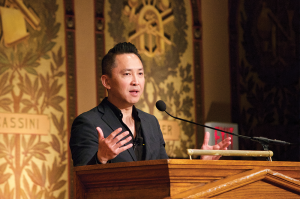
Pulitzer Prize-winning author Viet Thanh Nguyen defended immigration as a part of a cosmopolitan view of world affairs in an event co-sponsored by The Hoya.
Cosmopolitanism can serve as an agent for peace in an age of conflict, according to Pulitzer Prize-winning author Viet Thanh Nguyen at a talk during an annual symposium hosted by the Lannan Center for Poetics and Social Practice in Gaston Hall on Tuesday.
“There are two Americas. There’s the America of openness, inclusion, and there’s the America of Make America Great Again,” Nguyen said. “No, we’re not winning, because as soon as we make an advance in one direction towards good or inclusion, the other side is getting ready to try to counter that in some way.”
This year’s two-day symposium, “The Global Soul: Imagining the Cosmopolitan,” focused on issues of nationhood, identity and transnationalism among others.
Nguyen said opposition to immigration and refugees is rooted in historical attitudes.
“Now we’re living in an era, of course, where the feeling against immigrants and against refugees has heightened in American society, but it’s not a new sentiment,” Nguyen said. “Racism, xenophobia, the desire to close the door against refugees and immigrants has also been as much a part of American society as has been this idea that immigrants should be welcomed and included here.”
Nguyen said refugees are cosmopolitans of a different kind than most that Americans may encounter.
“If they’re bilingual, if they cross borders, if they survived from one country to the next, they are much more cosmopolitan than your average American, who has never left this country, only speaks one language, and could not survive if you put them into a very difficult situation,” Nguyen said.
Nguyen stressed the importance of confronting America’s negative attitudes toward immigrants, especially those who are writers, students and scholars.
“These two realities of America: the cosmopolitan America that welcomes immigrants and refugees, and the imperial America that bombs these countries from which immigrants and refugees come is the same reality. It’s a difficult reality to confront,” Nguyen said.
Nguyen emphasized the importance of minority writers contributing stories about people and groups whose perspectives might otherwise go unvoiced.
“We are going to be forever fighting this conflict because we are never going to have equal access to storytelling. We are never going to have equality in narratives. People for the majority live in an economy of narrative plenitude, they have thousands of stories about them. So one story more or less doesn’t make any difference,” Nguyen said. “But for us, who are in an economy of narrative scarcity, where there is such few stories, every story counts.”
According to Nguyen, minority writers face pressure from their own communities when writing about underrepresented populations.
“Minority writers often feel tempted to humanize because there is this perception that they are working against stereotypes, working against these inadequate understandings of whatever community they are talking about,” Nguyen said. “They want to foreground something positive about that community, and they’re also worried about their communities response to their work.”




















